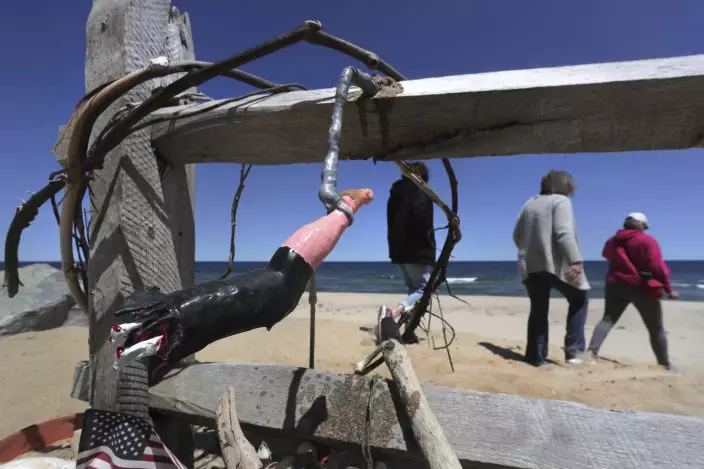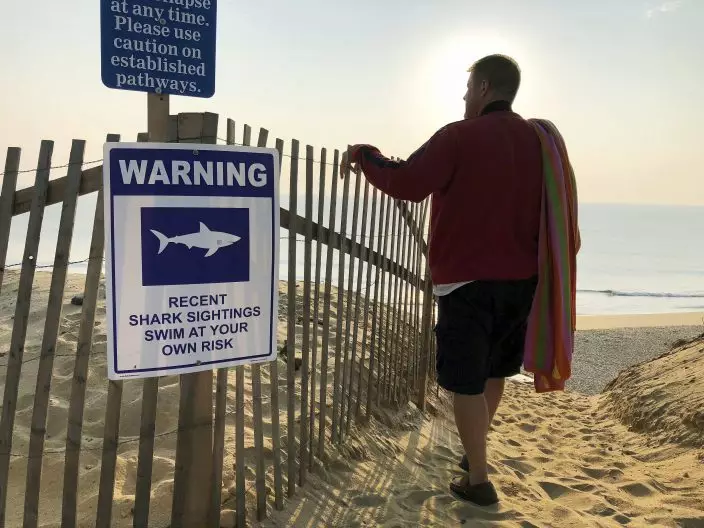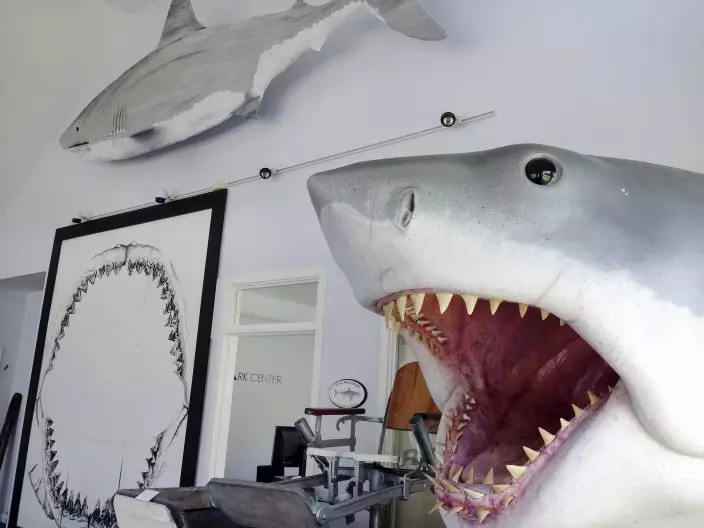Researchers on Cape Cod are launching a new study focused on the hunting and feeding habits of the region's great white sharks following last year's two attacks on humans, including the state's first fatal one in more than 80 years.
The hope is that the work, which starts in the coming days, contributes critical information to the ongoing debate over how to keep Cape beachgoers safe, said state marine biologist Greg Skomal, who has been studying the region's great whites for years and is leading the new effort.
"If we can figure out how, where and when these sharks are attacking seals, we may be able to see if there is a pattern or any predictability to it," he said. "That's really useful information for someone trying to manage their beach and enhance public safety. If there are hot spots that can be identified, we certainly want to share that information with the public."

FILE - In this May 22, 2019, file photo, three women pass a makeshift memorial at Newcomb Hollow Beach, where a boogie boarder was bitten by a shark in 2018 and later died of his injuries, in Wellfleet, Mass. Researchers on Cape Cod are launching a new study focused on the hunting and feeding habits of the region's great white sharks following two attacks on humans in 2018, including the state's first fatal one in more than 80 years. (AP PhotoCharles Krupa, File)
Cape Cod officials have been wrestling with how to respond to public concern in the aftermath of last year's attacks. A New York man was badly mauled by a shark last August off a beach in Truro but survived. Then weeks later a Massachusetts man was killed by a shark while boogie boarding in nearby Wellfleet.
Local officials have focused on ways to improve emergency response at area beaches this season, such as installing emergency call boxes and first aid kits stuffed with tourniquets and other medical supplies. Lifeguards have also been trained in how to spot sharks and respond to shark attacks, and many towns have invested in better communications systems, ATVs and other equipment for emergency responders.
The new research project by the state Division of Marine Fisheries and the nonprofit Atlantic White Shark Conservancy calls for placing specialized tags on the shark's dorsal fins.

FILE - In this Aug. 16, 2018, file photo, Steve McFadden, of Plattsburgh, N.Y., gazes at Long Nook Beach in Truro, Mass. Researchers on Cape Cod are launching a new study focused on the hunting and feeding habits of the region's great white sharks following two attacks on humans in 2018, including the state's first fatal one in more than 80 years. (AP PhotoWilliam J. Kole, File)
These "acceleration data loggers," or ADLs, will allow researchers to monitor a shark's movement in much greater detail than before, capturing data on swimming speed as well as depth and body position in the water. Some of the devices will even be equipped with video cameras.
"We're going from tracking day-to-day and seasonal movements to minute-to-minute, even second-to-second, fine-scale movements," Skomal said.
The study builds on Skomal's previous five-year study of the region's sharks, which concluded last summer and focused on how many sharks migrate to the region each summer, where they spend their time along the Cape and how long they stay.

FILE - In this May 25, 2016, file photo, replicas of great white sharks are displayed at the Atlantic White Shark Conservancy's Chatham Shark Center in Chatham, Mass. Researchers on Cape Cod are launching a new study focused on the hunting and feeding habits of the region's great white sharks following two attacks on humans in 2018, including the state's first fatal one in more than 80 years. (AP PhotoPhilip Marcelo, File)
He hopes the new data — combined with the information still being analyzed from the prior study — can also shed light on how many seals the region's great whites are actually eating and whether that's having an impact on the seal population. Some residents and commercial fishermen have suggested the region's ever-growing seal population is the more pressing problem, since that's what's drawing the sharks in the first place.
And researchers will start tagging and tracking sharks in Cape Cod Bay, where anglers have been increasingly complaining of white sharks snatching fish from their lines. Researchers in prior studies only tagged white sharks in the ocean waters between Provincetown to Chatham.
"A lot of the reports we get from fishermen seem to suggest they're smaller white sharks," said Megan Winton, a scientist with the Atlantic White Shark Conservancy. "So if there are smaller sharks in the bay, do they tend to stay there versus hanging out in the outer cape with the big sharks? And if so, what is it about the bay that keeps them there?"
Follow Philip Marcelo at twitter.com/philmarcelo.










